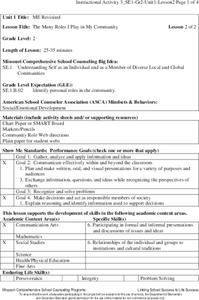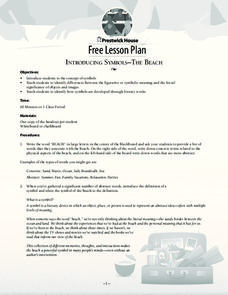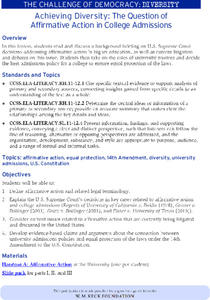PBS
Facts vs. Opinions vs. Informed Opinions and their Role in Journalism
Do reporters write about what they see, or what they think? Examine the differences between investigative writing and opinion writing with a lesson from PBS. Learners look over different examples of each kind of reporting, and convince...
California Department of Education
Gaining by Giving
Community service is a win-win! Scholars discover how to gain valuable career skills through helping others using a lesson about volunteer work. Second in a six-part career and college readiness series, the activities focus on...
Missouri Department of Elementary
The Many Roles I Play in My Community
Small groups brainstorm their roles in the community. Then, individually, complete a community roles web worksheet. Peers share their completed product and extend the conversation to include the feelings and character traits that go...
Film English
Gratitude
Encourage your class to experience gratitude. In order to do so, discuss what your pupils are grateful for and show them a short film about gratitude. The class watches the video a couple of times before responding to a quotation taken...
Prestwick House
Introducing Symbols–The Beach
Looking for a way to introduce class members to the concept of symbolism and multiple levels of meaning? Readers examine two different passages about the beach and consider how the writers use concrete objects, and places to represent...
Daughters of the American Revolution
Lesson 1: How Do Society’s Expectations Influence Education?
The history of women's education can be traced back to the delicate stitching of student samplers from the 19th century. Modern-day pupils examine and analyze four primary sources, three of which are images of embroidered samplers, which...
Science 4 Inquiry
Body in Balance
The human body maintains homeostasis through the interconnection of multiple systems. Young scientists match these connections and discuss how they relate to each other. They apply their knowledge to solve the mystery of a treasure hunter.
Constitutional Rights Foundation
Achieving Diversity: The Question of Affirmative Action in College Admissions
How can a college board of trustees both increase cultural and racial diversity and offer all incoming learners equal protection under the Fourteenth Amendment? Class members debate the question using readings about how colleges use...
Rainforest Alliance
Protecting the Critical Habitat of the Manatee and Loggerhead Turtle
Explore ocean habitats with a lesson plan that showcases the home of manatees and loggerhead turtles in Belize. Here, pupils compare and contrast the homes of ocean animals to those of humans, listen to an original short story about the...
Facebook
Introduction to Privacy
Sharing may be caring, but how much is too much? Young digital citizens ponder personal information during a activity from a module about privacy and reputation. Individuals take a survey, then mingle with classmates in a privacy game...
Soft Schools
Civil Rights
Informational text about the Civil Rights Movement challenges young historians to prove their reading comprehension skills with six multiple choice questions. After answers are submitted a new screen displays a score, answers—correct and...
Stanford University
Civil Rights Act of 1964
Was JFK a fallen Civil Rights hero—or a fraud? Learners examine Kennedy's own words and those of his critics to decide for themselves. After examining Kennedy's actions before his assassination, they determine what sort of legacy he left...
EngageNY
Similarity and the Angle Bisector Theorem
Identifying and verifying reproducible patterns in mathematics is an essential skill. Mathematicians identify the relationship of sides when an angle is bisected in a triangle. Once the pupils determine the relationship, they prove it to...
Houghton Mifflin Harcourt
Smart Solutions: English Language Development Lessons (Theme 6)
Smart Solutions is the theme of a unit created to meet the needs of English language earners. Through a series of lessons, scholars follow a routine—move, speak, and listen— to cover topics including stores, shops, celebrations, pets,...
EngageNY
Building Background Knowledge: The Boy Who Invented TV, “Life before Philo”
Walk through the pictures to understand the text. Scholars analyze The Boy Who Invented TV: The Story of
Philo Farnsworth by taking a book walk and looking at the pictures. They then do a first read of Life before Philo to determine the...
Curated OER
Book Club Discussion: Things Fall Apart
Students read and discuss Chinua Achebe's novel Things Fall Apart. Students are guided to analyze the text through consideration of the author's use of 6 literary devices. Students also evaluate the text according to their personal...
Curated OER
Leadership and Proactive Problem solving: Discussion Scenarios For International Travel and Development Work
Students take an international trip to explore global issues and problems. In preparation for the trip, groups of students participate in a role play of situations they may face overseas. They discuss the outcome and problem solving...
Curated OER
Life Skills - "Do You Feel Like I Feel?" - Understand And Expressing Emotions
In this life skills worksheet, students learn how to understand and express their emotions. They then answer the 10 questions in the packet.
Curated OER
Who Works at Our School?
Young interviewers will learn more about the school staff by asking them questions and creating a bulletin board display. They will learn how to make thoughtful interview questions, conduct professional interviews, and organize...
Curated OER
Greed is Good?
From Mr. Merdle to Mr. Madoff? A viewing of the PBS adaptation of Charles Dickens’ “Little Dorrit” launches an examination of greedy characters in literature and a study of greed, unfairness, and economic hardship today. The richly...
Curated OER
Time Capsule Essay
Discuss your class' vision of the future. Learners create materials for use in a time capsule. They write letters to explain their contribution and provide photos. Afterwards, they use higher-level thinking skills to reflect on why they...
Curated OER
Silly to Serious Cards and Panels
What are the unwritten rules of formality in different social situations? Help learners identify when it is the appropriate time to be silly, funny, or serious with this collection of illustrated panels and cards.
Curated OER
Identify Healthy Food and Lifestyle Choices
Poll your scholars about their choices on food they eat, or don't eat, and on maintaining a healthy lifestyle. Topic statements such as "I ate breakfast this morning" start a discussion on what are healthy choices and what are unhealthy...
Curated OER
Much Ado About Nothing: Bloom's Taxonomy Questioning Strategy
Do your class members’ questions lack depth? “Sigh no more . . .sigh no more.” Use a questioning strategy based on Bloom’s taxonomy to encourage readers to create questions that probe the themes of any text. The model discussion...

























